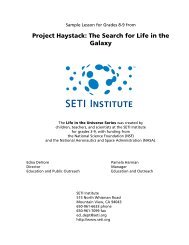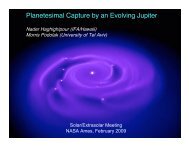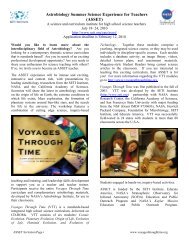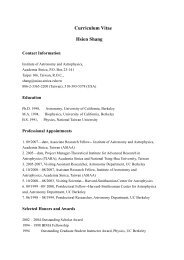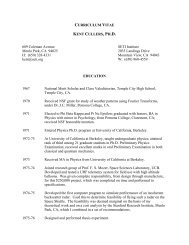SETI Institute Frequently Asked Questions To help you quickly find ...
SETI Institute Frequently Asked Questions To help you quickly find ...
SETI Institute Frequently Asked Questions To help you quickly find ...
- No tags were found...
You also want an ePaper? Increase the reach of your titles
YUMPU automatically turns print PDFs into web optimized ePapers that Google loves.
if we detect a signal without being able to understand<br />
it, that would still tell us that we are not unique in the<br />
universe. The effect on society might be as profound<br />
and long lasting as when Copernicus displaced the<br />
Earth from the center of our universe.<br />
What do other scientists think of the search for extraterrestrial<br />
civilizations<br />
Most scientists support the search. Here are some<br />
quotations from professional reviews: From the Report<br />
of the Astronomy Survey Committee, National<br />
Academy of Sciences, 1972: "... More and more scientists<br />
feel that contact with other civilizations is no<br />
longer something beyond our dreams but a natural<br />
event in the history of mankind that will perhaps<br />
occur in the lifetime of many of us ... In the long run,<br />
this may be one of science's most important and most<br />
profound contributions to mankind and to our civilization."<br />
From the Report of the Astronomy Survey Committee,<br />
National Academy of Sciences, 1982: "... It is<br />
hard to imagine a more exciting astronomical discovery<br />
or one that would have greater impact on human<br />
perceptions than the detection of extraterrestrial intelligence."<br />
From the Report of the Astronomy Survey Committee,<br />
National Academy of Sciences, 1991: "... The<br />
discovery in the last decade of planetary disks<br />
(around other stars), and the continuing discovery of<br />
highly complex organic molecules in the interstellar<br />
medium, lend even greater scientific support to this<br />
enterprise."<br />
Do the recent discoveries of extrasolar planets and<br />
possible microfossils from Mars affect <strong>you</strong>r research<br />
Yes and no. It turns out that most of the stars discovered<br />
to have planetary systems were already on Pro j-<br />
ect Phoenix's target list. It also confirms an early<br />
premise of <strong>SETI</strong> scientists -- namely that planets<br />
ought to form around a significant fraction of stars in<br />
our galaxy. The Mars meteorite <strong>find</strong>ing is another<br />
potential confirmation that life is indeed common<br />
throughout the universe. In fact, some <strong>Institute</strong> scientists<br />
are involved in planning future NASA missions<br />
to Mars.<br />
IV. <strong>SETI</strong>, Education and Public Outreach<br />
civilizaciones tecnológicas, ¿pueden perdurar largos<br />
periodos de tiempo, o inevitablemente se<br />
autodestruyen, o mueren por cualquier otra razón Si<br />
además lográsemos entender una señal, existe siempre<br />
la posibilidad de encontrarnos con conocimientos<br />
extremadamente valiosos. Lo más probable es que<br />
cualquier civilización que lográsemos detectar esté<br />
mucho más avanzada que nosotros, y puedan<br />
ayudarnos a introducirnos en una red galáctica de<br />
seres inteligentes. Pero incluso si detectásemos una<br />
señal que no fuésemos capaces de entender, sería<br />
suficiente para indicarnos que no estamos solos en el<br />
universo. El efecto sobre la sociedad sería tan<br />
profundo y duradero como cuando Copérnico sacó a<br />
la Tierra del centro del universo.<br />
¿Qué piensan otros científicos de la búsqueda de<br />
civilizaciones extraterrestres<br />
La mayoría de los científicos apoyan esta<br />
investigación. Veamos algunas referencias de revistas<br />
profesionales. Del Informe el Comité para el Estudio<br />
de la Astronomía, Academia Nacional de Ciencias, en<br />
1972: “...Más y más científicos sienten que el<br />
contacto con otras civilizaciones ya no es algo más<br />
allá de nuestros sueños, sino un suceso normal en la<br />
historia de la Humanidad que puede ocurrir durante<br />
nuestras vidas... A la larga, esta será una de las<br />
contribuciones más importantes y profundas de la<br />
ciencia a la Humanidad y a nuestra civilización”.<br />
En el informe del mismo órgano del año 1982, puede<br />
leerse: “...Es difícil imaginar un descubrimiento<br />
astronómico más interesante, o uno que tuviese más<br />
efecto sobre las percepciones humanas, que la<br />
detección de inteligencia extraterrestre”. Mientras que<br />
en el del año 1991 se indica: “El descubrimiento en la<br />
última década de discos planetarios (alrededor de<br />
otras estrellas), y el continuo descubrimiento de<br />
moléculas extremadamente complejas en el medio<br />
interestelar, proporcionan un apoyo científico incluso<br />
mayor a esta empresa”.<br />
Los recientes descubrimientos de planetas<br />
extrasolares y posibles microfósiles marcianos,<br />
¿afectan a la investigación<br />
Si y no. Resulta que la mayoría de estrellas a las que<br />
se han descubierto sistemas planetarios ya estaban en<br />
la lista de objetivos del proyecto Phoenix. Confirman<br />
una de las premisas originarias de los científicos<br />
<strong>SETI</strong>: que los planetas deberían formarse alrededor de<br />
una fracción significativa de estrellas en nuestra<br />
galaxia. El descubrimiento del meteorito marciano




